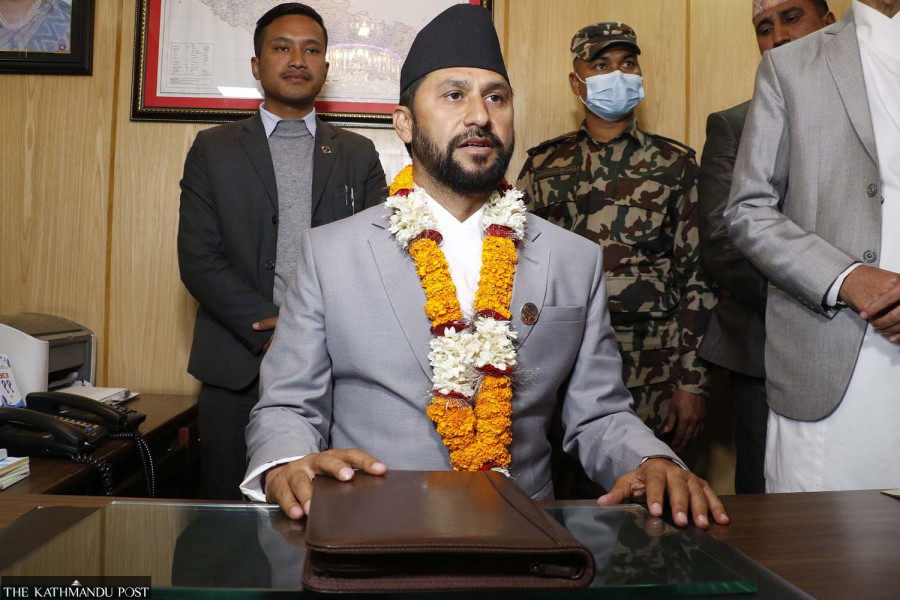National
Hearing to continue tomorrow in home minister’s citizenship case
Supreme Court spokesperson hints at some kind of ruling on that day.
Post Report
The final hearing on the writ petitions challenging Minister of Home Affairs Rabi Lamichhane’s legitimacy as a member of the House of Representatives will continue on Friday.
Acting Chief Justice Hari Krishna Karki-led Constitutional Bench couldn’t complete the hearing on Wednesday, pushing it until Friday. “The final hearing will continue on Friday as well,” Bimal Poudel, spokesperson for the Supreme Court, told the Post. “Some kind of a ruling is possible on that day.”
On December 14, advocates Yubaraj Poudel and Rabiraj Basaula had registered a writ petition at the Supreme Court arguing that Lamichhane cannot become a member of parliament because he doesn’t have the Nepali citizenship. The writ petitioners had also demanded that the Supreme Court issue an interim order to stop Lamichhane from working as a lawmaker until the final court verdict.
The court refused to issue an interim order in the preliminary hearing on January 6. However, it kept the petitions on the priority list and decided for a continuous hearing starting January 25. The Constitutional Bench sits twice a week—Wednesday and Friday.
Putting forth his arguments on behalf of the petitioners, senior advocate Surendra Bhandari claimed Lamichhane was not a Nepali citizen.
“He doesn’t possess the Nepali citizenship. He hasn’t followed the due legal procedure to reclaim his citizenship,” said Bhandari. “He, therefore, is not a Nepali citizen.”
The plaintiffs have argued that just abandoning the foreign citizenship is not enough to reclaim the original citizenship. Lamichhane in February 1994 acquired citizenship by descent. Twenty years later, he in 2014 got American citizenship. His Nepali citizenship got automatically scrapped the day he became an American citizen as per the Citizenship Act.
Section 10 of the Act says any Nepali citizen who voluntarily acquires the citizenship of any foreign country will automatically lose the Nepali citizenship.
Lamichhane, a media person by profession, returned to Nepal a few months after becoming an American citizen and started working here.
After four years, a complaint was lodged in the Press Council Nepal saying that he was working in Nepal without a work permit. A foreign national needs a permit to work in Nepal. Only after the criticism did Lamichhane in May 2018 abandon the American citizenship and its proof was presented to the Department of Immigration.
He, however, never applied to reclaim his citizenship. Lamichhane’s lawyers have argued that as he never renounced Nepali citizenship, his citizenship from 1994 got automatically revived the day he surrendered American Citizenship.
The Citizenship Act, however, doesn’t say so. Section 11 of the Citizenship Act says if any citizen of Nepal who has acquired foreign citizenship returns to reside in Nepal and submits a notification to the designated authority the evidence of renunciation of foreign citizenship, his/her Nepali citizenship shall be provided again once s/he submits the evidence of renunciation.
An application needs to be submitted to the respective office to reclaim the Nepali citizenship as per the Act and its regulation.
Clause 11 of the regulation to the Act says the person who has renounced the foreign citizenship should apply to the Ministry of Home Affairs or the concerned District Administration Office. The concerned authority, after studying the application, would issue the citizenship of Nepal containing the same details mentioned in the previous document. The copy of the citizenship he had produced to file the nomination was issued in 1994.
Defending Lamichhane, the Attorney General’s Office has argued that the provision in the regulation is just procedural; therefore, his citizenship is reclaimed once he abandoned the foreign citizenship. “The petitions against Lamichhane are deemed to be scrapped because our Citizenship Act doesn’t envision a condition where one is without citizenship,” Sanjeev Regmi, a joint Attorney General argued. “His citizenship was reinstated once he decided to renounce the foreign citizenship.”




 9.51°C Kathmandu
9.51°C Kathmandu













